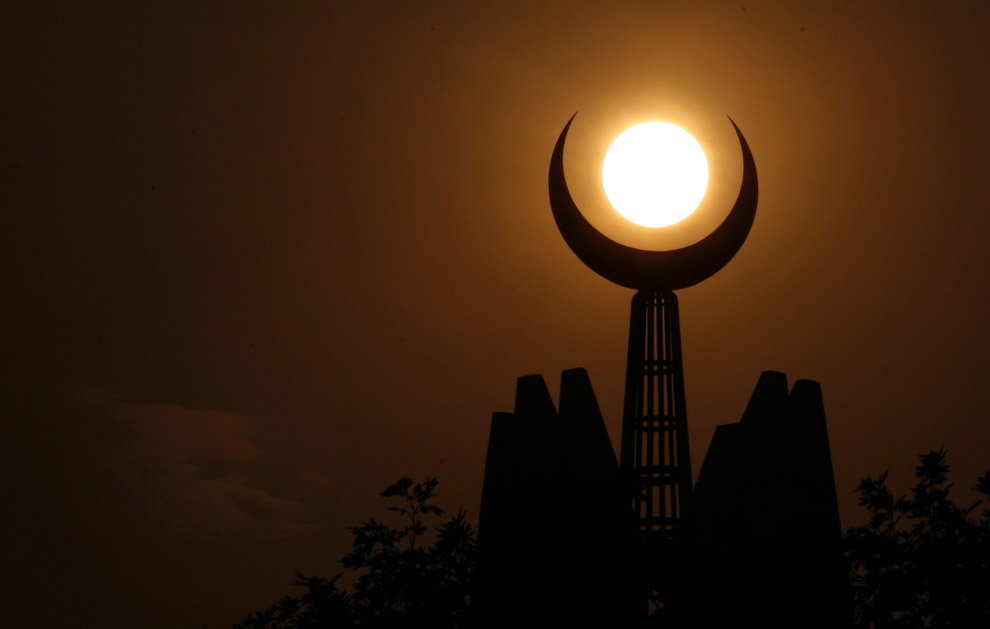As soon as Prophet Ibrahim departs, baby Ismail began to cry for sustenance, for water. His mother could not bear the sight of pain her child was experiencing.
Thus, she began to run in-between the two hills in the area; in between Safa and Marwa. By the time she completed the seventh run, she discovered that some semblance of water had started gushing out from the spot where the heels of her baby was kicking on the ground.
She then rushed to the spot. Lo! And behold, it was water. Water was gushing out from under Ismail’s heels. She then knelt beside the spot. She began to dig at the spot. She began to shout, in excitement missed with desperation and laced with hope saying- ‘Zum-zum’ -pour out, pour out’.
Thanks to his (Prophet Ibrahim) departure, or rather disappearance, the search for sustenance was undertaken by He who could provide it. Hajar ran between the hills of Safa and Marwa looking at far distances for water, for sustenance, not knowing that al-Raziq had already decided to provide their subsistence from a spot nearby, from under the hills of her child.
Thus, by saying ‘zum-zum’, little spots of water became a fountain. By saying ‘zum-zum’, the water became known as ‘Zam-zam’. Yes. We often embark in long search for solutions to our earthly challenges though the real solutions is very near to us; we often look up to men and women to assist us overcome our challenges not knowing that the real “Solver” of problems had already concluded on lifting us up from the abyss of want and fear.
Then all of a sudden, Prophet Ibrahim showed up again. He showed up after baby Ismail had become a teenager. He showed up after his son had reached the age of discernment.
The Almighty presents the story thus: “And, when he (his son) was old enough to walk with him, he said: “O my son! I have seen in a dream that I am sacrificing you to the Almighty, so what do you think of that!”.
Then the son responded: “O my father! Do that which you are commanded, by His will, you shall find me of among the patient ones” (Quran 37: 102).
Father and son soon reached a consensus on the necessity to not ask any question once the desire of the Almighty is at issue. Now, what about Ismail’s mother? What was her opinion? How did she react when she heard that her only child was going to be sacrificed?
Her reaction was one of submission and contentment with the Almighty’s desire. She therefore bore the potential grief of the loss of her only child with equanimity.
She held her tongue from muttering imprecations and indecencies. She stood beside her husband, not against him, while he set out to carry out a mission that had been destined to be other than what he thought he saw.
In other words, the mission the Almighty actually wanted Prophet Ibrahim (a.s) to carry out for generations after him was the slaughtering of animals as sacrifice to the Almighty, not his son. Prophet Ibrahim (a.s) could not have known this ahead of time; there is just no way of knowing the unknowable in the works of the inimitable.
Let me begin to close by asking mothers of today this question: do you want your children to be what you desire for them or what the Almighty wants them to be?
Khalil Gibran, an Arab-American poet, presents a perspective I found to be highly instructive and germane. He says: “A woman held a babe against her bosom and said, “Speak to us about yourself” And the child responded: “Your children are not your children.
They are the sons and daughters of life’s longing for itself. They come through you but not from you; though they are with you, yet they belong not to you. You may give them your love but not your thoughts. For they have their own thoughts.
You may house their bodies but not their souls, For their souls dwell in the house of tomorrow, which you cannot visit, not even in your dreams. You may strive to be like them, but seek not to make them like you.
For life goes not backward nor tarries with yesterday. You are the bows from which your children as living arrows are sent forth. The Archer sees the mark upon the path of the infinite, and He bends you with His might that His arrows may go swift and far.
Let your bending in the Archer’s hand be for gladness; for even as he loves the arrow that flies, so He loves also the bow that is stable.

 Join Daily Trust WhatsApp Community For Quick Access To News and Happenings Around You.
Join Daily Trust WhatsApp Community For Quick Access To News and Happenings Around You.


